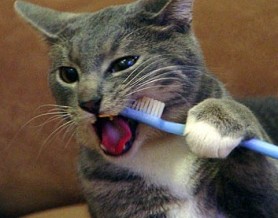 As a pet owner you may be very familiar with this scene; it’s another early morning and your dog wants to go out, he comes by your side of the bed to be the alarm clock and then his breath hits you. Suddenly, you’re wide awake to the smell of not-so-fresh breath, and your first stop for the morning is to get some minty dog biscuits.
As a pet owner you may be very familiar with this scene; it’s another early morning and your dog wants to go out, he comes by your side of the bed to be the alarm clock and then his breath hits you. Suddenly, you’re wide awake to the smell of not-so-fresh breath, and your first stop for the morning is to get some minty dog biscuits.
Bad breath can be the first sign your dog may need to improve their dental game. In honor of National Pet Dental Health Month, Furry Footsteps LLC is here to give you the basics of keeping pet teeth happy. Read on to see what pet dental health includes, how to help your pet have healthy teeth, and why it should be a priority to you.
What is Dental Disease in Pets:
Our pets’ teeth are just like ours; as we age, our teeth accumulate plaque, sometimes get cavities, and are occasionally in need of a root canal. As puppies or kittens, our pets will lose their baby teeth in their first year and then grow adult teeth, which will hopefully last for life. With their adult teeth, plaque occurs naturally and slowly hardens into tartar, which causes inflammation. According to the American Veterinary Dental College, most pets will show signs of periodontal disease, which includes inflammation and loss of tissue or teeth, by the time they are three.
Periodontal disease can be as simple as tartar build up that causes inflammation in the gums and can progress to infection in the gum or tooth. Advanced periodontal disease can cause loss of teeth, infections below the gum line, and complications from severe infections that can include disease in the kidneys, liver and heart.
The signs that your pet may be in need of a trip to the dentist are easy to spot if you know what you are looking for. Bad breath, chewing on one side, dropping food from the mouth, a reluctance to eat, drooling, discolored teeth, or red or bloody gums are symptoms of dental disease that can impact your pets’ life. Pets with diabetes are also more likely to have dental issues than pets without diabetes. Dental health can be the first step to preventing future health issues.
 How to Care for Your Pets Dental Health:
How to Care for Your Pets Dental Health:
Pet dental care can be taken care of in two places; in the home and at your friendly neighborhood vet’s office. As part of your pets’ yearly checkup, your vet will give a quick visual check of your pets’ teeth. While not all periodontal disease is visible above the gum-line, this can gauge the amount of tartar buildup on your pets’ teeth. Most vets also recommend a yearly dental cleaning as part of preventative health care.
During a dental cleaning visit, your cat or dog will be put under anesthesia, which allows the pet to be comfortable during the loud machinery and stressful cleaning. This also lets your veterinarian give a thorough examination of their teeth. X-rays may be taken during anesthesia to make sure there are no infections below the gum, which may call for removal of problematic teeth. If only a cleaning is necessary, the vet or technician will remove tartar and polish your pets’ teeth the same way you would at your dentist. Then your pet will wake up from anesthesia with a little soreness and much fresher breath, guaranteed until next year.
The second way you can care for your pets’ teeth is through at home tooth brushing. Similar to teaching a toddler about brushing teeth, the key is fun flavors in toothpaste (chicken, liver or beef, anyone?) and lots of positive reinforcement. Special toothbrushes and toothpastes are available at your local pet store, and, with lots of treats, your cat or dog will be lining up for their brushing a couple times a week. Home pet health can be an excellent tool in your fight for, if not minty-fresh, then at least pleasant-smelling pet breath.
While some bones and pet foods advertise their dental benefits, it’s always best to discuss other dental healthcare methods with your vet before investing.
Why Pet Dental Health Is Important:
Flea prevention, nail clipping, internal parasites…there is a long list of potential health issues that we, as owners, worry about. Taking care of your pets’ teeth can not only impact your relationship (no more wake-ups to fishy breath) but also can extend the years of good health you have to enjoy with your pet. Despite being a relative easy fix, diseased teeth can affect not only your cats’ breath but also their quality of life. Liver, kidney, and heart disease, loss of teeth and the ability to chew their own food, teeth can affect many areas, so it’s always best to take care of them.
Pet dental health is an important cornerstone for good health in general, and is extremely easy to maintain. With a toothbrush and an annual visit to the vet office, your pet can avoid losing teeth, damage to their body, and still enjoy their meals every day. Check with your local vet office for deals on dental cleanings, many run special pricing in honor of National Pet Dental Health Month.
In addition, feel free to discuss with Furry Footsteps LLC the possibility of working toothbrushing and dental care into your pets’ routine today!
 Latoya Anderson says
Latoya Anderson says
February 23, 2018 at 2:30 amThe best part of your blog for me is when you talked about the importance of pet dental health to the overall health of your pets and how easy it is to maintain it. I have 3 new dogs in my house that I’d like to take care properly. I understand that any dental problems can greatly affect the quality of their lives and their lifespan. This is why it will be ideal for me to ensure that they will be able to keep a good oral condition. I will make sure to visit a professional with them soon for a dental checkup. Thanks!
 Jeremy Schoenfeld says
Jeremy Schoenfeld says
September 18, 2018 at 9:54 pmDental care is really important for pets. Sad thing is many people ignore it.
 Bill says
Bill says
August 21, 2019 at 8:07 pmdo you know where to find the best dental care pets in South Florida?